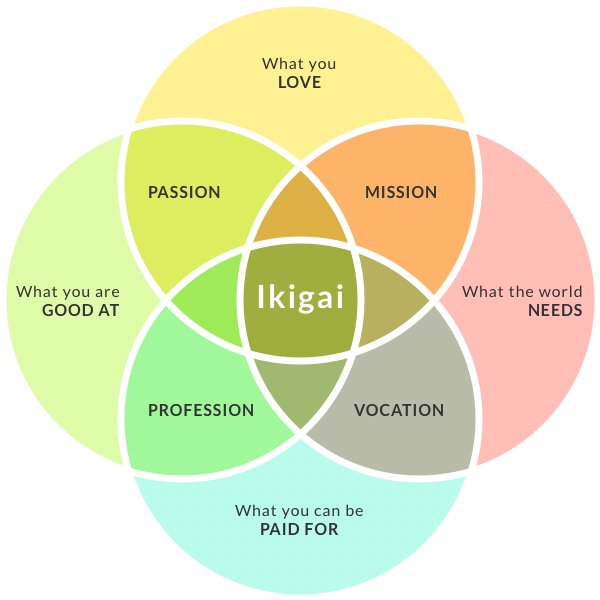 > >The case of IkigaiA well-being concept from the Japanese culture Roughly, the Japanese word Ikigai consists of two words, iki (to live) and gai (reason). Even thou, there is no exact English translation: Ikigai represents a concept, roughly meaning to live a purposeful life worth living. It is a cognitive and behavioural hub, including various life habits and value systems applied in different contexts of life, to small everyday things as well as big goals and achievements. Ikigai is based on five pillars: 1. Starting small: waking up early, being humble, working diligently and executing every step of your work to perfection, recognising the richness of small advancements. 2. Releasing yourself: accept yourself for who you are, release your past and present. 3. Harmony and sustainability: the social element of Ikigai, referring to being comfortable and in harmony with your role in your family, job, and society; reservation and self-restraint is of primary importance. 4. The joy of little things: enjoying everyday things and events. 5. Being in the here and now: paying attention to the multitude of sensory experiences and small things you encounter in life, being mindful and appreciating the present. Contemporary applications of Ikigai include clinical practice, wellbeing training and career guidance. In the context of Spa and wellness, the concept can be used at least in three different ways for three different stakeholders and beneficiaries: See more
|
 > >The case of IkigaiA well-being concept from the Japanese culture Roughly, the Japanese word Ikigai consists of two words, iki (to live) and gai (reason). Even thou, there is no exact English translation: Ikigai represents a concept, roughly meaning to live a purposeful life worth living. It is a cognitive and behavioural hub, including various life habits and value systems applied in different contexts of life, to small everyday things as well as big goals and achievements. Ikigai is based on five pillars: 1. Starting small: waking up early, being humble, working diligently and executing every step of your work to perfection, recognising the richness of small advancements. 2. Releasing yourself: accept yourself for who you are, release your past and present. 3. Harmony and sustainability: the social element of Ikigai, referring to being comfortable and in harmony with your role in your family, job, and society; reservation and self-restraint is of primary importance. 4. The joy of little things: enjoying everyday things and events. 5. Being in the here and now: paying attention to the multitude of sensory experiences and small things you encounter in life, being mindful and appreciating the present. Contemporary applications of Ikigai include clinical practice, wellbeing training and career guidance. In the context of Spa and wellness, the concept can be used at least in three different ways for three different stakeholders and beneficiaries: See more
|
 > >The case of IkigaiA well-being concept from the Japanese culture Roughly, the Japanese word Ikigai consists of two words, iki (to live) and gai (reason). Even thou, there is no exact English translation: Ikigai represents a concept, roughly meaning to live a purposeful life worth living. It is a cognitive and behavioural hub, including various life habits and value systems applied in different contexts of life, to small everyday things as well as big goals and achievements. Ikigai is based on five pillars: 1. Starting small: waking up early, being humble, working diligently and executing every step of your work to perfection, recognising the richness of small advancements. 2. Releasing yourself: accept yourself for who you are, release your past and present. 3. Harmony and sustainability: the social element of Ikigai, referring to being comfortable and in harmony with your role in your family, job, and society; reservation and self-restraint is of primary importance. 4. The joy of little things: enjoying everyday things and events. 5. Being in the here and now: paying attention to the multitude of sensory experiences and small things you encounter in life, being mindful and appreciating the present. Contemporary applications of Ikigai include clinical practice, wellbeing training and career guidance. In the context of Spa and wellness, the concept can be used at least in three different ways for three different stakeholders and beneficiaries: See more
|
Powered by MMS 3.1 - © 2021 EUROTEAM |
|---|